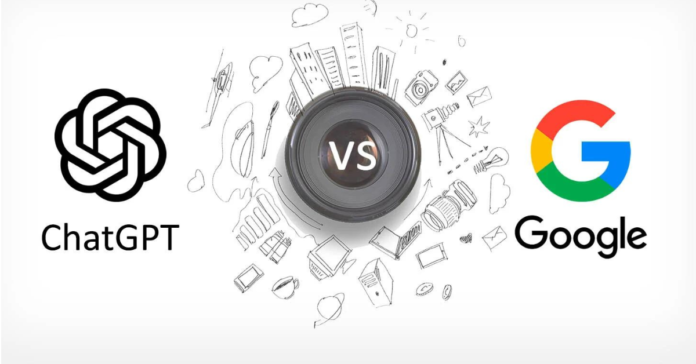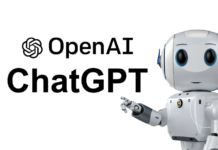
Two of the top players in the field of natural language processing are ChatGPT and Google. The potential for these tools to revolutionize how we communicate and engage with technology is becoming more and more obvious as AI language models keep getting better. We will examine the distinctions between ChatGPT and Google in this article and analyze if ChatGPT has the capability to challenge Google’s hegemony in the search engine industry.
Differences Between ChatGPT and Google
With more than 5 billion queries being made on Google every day, it is one of the most popular search engines in the world. The ChatGPT, on the other hand, is a sophisticated AI-based natural language processing system that has gained popularity recently because of its capacity to comprehend and react to human language in a more human-like manner. In a very short period of time since the release of its most recent version, the ChatGPT has smashed numerous records. One of these entails crossing 100 million daily active users by the beginning of 2023.
Although ChatGPT and Google are both utilized for natural language processing, their approaches to language processing are quite dissimilar. Google uses a system known as semantic search to understand the context and meaning behind search queries. Contrarily, ChatGPT is built using a language model that can generate human-like text based on the input provided.
Another key distinction between ChatGPT and Google is the way in which they are trained. ChatGPT is trained on a massive amount of text data, while Google’s natural language processing algorithms are trained on a combination of text data and user feedback.
Strengths and Weaknesses
Both ChatGPT and Google are efficient natural language processing tools, yet each has its owns strengths and weaknesses. On one hand, the ChatGPT’s conversational approach makes it well-suited for chatbots and other conversational AI applications, and on the other hand, Google’s natural language processing capabilities are better suited for search engine queries and interpreting user’s intent.
Nevertheless, ChatGPT’s vulnerability to bias and ethical issues, may be greater than Google’s natural language processing tools. This is due to the fact that ChatGPT was developed using a vast amount of text data, some of which could have been biased or prejudiced. This data could have been used to train the model which can cause partiality. Moreover, ChatGPT may produce results that are false, misleading, or used to propagate misinformation or propaganda. Since, ChatGPT is trained on a set volume of data, it cannot recover the most recent information or findings.
Can ChatGPT Replace Google?
A curiosity among people can be observed whether Google’s search engine can be replaced by ChatGPT. Google has been around for more than two decades and has a well-established userbase. Moreover, Google is not just a search engine but also provides many other services like email, cloud storage, maps and many more. It’s true to some extent that ChatGPT will be able to put some dent on Google’s search engine revenue, but other services of Google are still irreplaceable. Furthermore, the information found on Google’s search engine can be seen as authentic because to some extent the source of the information can be verified. On the other side, on ChatGPT the source of the information is unclear. So, there’s always a doubt on the information being provided.
Additionally, Google is also spending a lot of money on artificial intelligence. Its aim is to integrate artificial intelligence into its search engine. It will be then used to provide more optimized and accurate search results for the enquiries done by the users. As mentioned before, ChatGPT will have some effect on Google’s earnings because a lot of Google’s revenue is generated through ads placed on websites or websites that are being advertised. But still Google is a huge brand and there are still a lot of challenges that ChatGPT need to overcome. For example, ChatGPT requires massive amount of computational power to generate text. On the other side, Google’s algorithms can easily run on a modest hardware without requiring huge amount of computational power.
The ChatGPT also needs to be trained on a diverse amount of dataset to eliminate the problem of bias and ethical concerns. For this purpose, again a lot of resources and infrastructure are required. This will also result in increasing the operational costs. Finally, as long as these challenges exist there’s a long way that ChatGPT or similar natural language processing tools need to cover to be considered as an alternative for Google.
Impact on the Job Market
There is also a growing concern about the effects of natural language processing tools on the job market. As these new tools continue to enhance their capabilities, they will for sure lead to job losses in certain sectors of the economy. For example, we can already observe the integration of ChatGPT in chatbots. In future, ChatGPT will definitely replace human chatbots which is financially more viable for the industries as well. ChatGPT could prove to be a better alternative for human chatbots because they can respond to human queries in a humanly way without even requiring a human. Furthermore, they will save companies from paying hefty salaries. This could potentially lead to significant number of job losses in the customer service industry.
Similarly, Google’s search engine is already offering support to the professional researchers and information gatherers. Unlike, ChatGPT completing replacing the researcher’s jobs the Google search engine or other features of Google are providing assistance to the workers, improving their work efficiency. Now, by using the Google’s search engine in combination with ChatGPT a lot of workers in different fields can enhance their work efficiency. Short, ChatGPT in combination with Google’s search engine can prove to be a deadly combo and a very useful tool for the workers, if used properly.
Whilst some may argue that these tools will replace a plethora of jobs, others contend that they will create new job opportunities in fields that are yet to be discovered. For instance, the upkeep and advancement of these tools will necessitate the employment of skilled workers, which will significantly increase the demand for proficient workforce in specific sectors, such as software development. Thus, the impact of natural language processing tools transcends just unemployment and has the potential to enhance the demand for skilled workers in a myriad of fields. As such, it is incumbent upon stakeholders to take remedial actions by providing the affected individuals with ample opportunities to transition to new roles or receive training in other domains. This could be achieved by allocating a specific sum of money from the annual budget to support the impacted individuals.
In conclusion, the emergence of ChatGPT may pose a challenge to Google’s search engine, but it is unlikely to supplant the diverse range of services offered by Google. Additionally, the introduction of natural language processing tools has the potential to cause job losses in particular sectors of the economy, while also creating fresh job opportunities in other fields. Thus, it is imperative for stakeholders to anticipate and prepare for these challenges to ensure that individuals affected by these technological advancements are not left behind.









